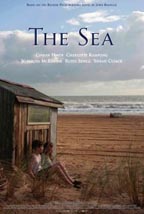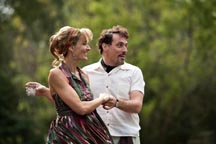Ciné Gael Montréal Irish Film Series 2014 ...our 22nd
Concordia University, 1400 de Maisonneuve West, at 7:15 PM, unless otherwise indicated. ...in 2014
the Opening Reception and film was $15; Single screenings were $10;
Closing Gala was $20;
Membership was $65 for all events.
Our programmers have been scanning film fleadh catalogues
and soliciting recommendations and screeners from our
film and filmmaker contacts in Ireland, and especially from IFI,
the Irish Film Institute.
![]()
We are, of course, always interested in direct contact from filmmakers with films they'd like to submit. Last year's winner of our first-time Short Films Audience Award was Shimmy Marcus, with Rhinos. He had contacted us with a submission before we'd discovered it ourselves. He was back again this 2014 season with a second winner, Hannah Cohen's Holy Communion.
We are always interested in submissions and recommendations of Irish-related films, whether they be features, shorts, documentary, animation, in Irish or English.
83 mins - Dir: Lance Daly editor, Shimmy Marcus; with Fionnula Flanagan, Pat Shortt, Kelly Thornton, Eva Birthistle.
 Just where do old mattresses go once they've been discarded, and how would concerned parties manage to track one down?
It takes a special kind of imagination to recognize the entertainment potential trapped in such a mundane scenario,
and an incredibly resourceful filmmaker to spin it into as much fun as Daly does here.
Just where do old mattresses go once they've been discarded, and how would concerned parties manage to track one down?
It takes a special kind of imagination to recognize the entertainment potential trapped in such a mundane scenario,
and an incredibly resourceful filmmaker to spin it into as much fun as Daly does here.
Beginning with a group of characters who'd be right at home in a Ken Loach movie, Life's a Breeze concerns three generations of borderline-broke Dubliners. Young Emma (Kelly Thornton) serves as the pic's eyes and ears, enlisted by thick-headed uncle Colm (Pat Shortt) to get Nan (Fionnula Flanagan) out of her cluttered flat one afternoon. The old lady is a bit of a hoarder, and her well-meaning kids plan a surprise makeover for her birthday. When Nan returns, however, she's horrified to discover that her stash of nearly a million Euros has been thrown out along with decades of newspapers, mildewing detective novels and creaky old furniture.
At first, the family refuses to believe that she's telling the truth. How could Nan have saved so much money?
 But all three of her kids are scraping by on the dole, and once the idea that their inheritance is on the line,
they spring into action, beginning a scavenger hunt that takes them from dumping grounds to recycling depots to landfills
all over the region, eventually ballooning into a national news story, as total strangers compete to see who can find the mattress first.
But all three of her kids are scraping by on the dole, and once the idea that their inheritance is on the line,
they spring into action, beginning a scavenger hunt that takes them from dumping grounds to recycling depots to landfills
all over the region, eventually ballooning into a national news story, as total strangers compete to see who can find the mattress first.
Daly's lucky to have as shrewd an actress as Flanagan at the center of such a project, relying on her ability to play cards close to her vest. While her generally dim-witted kids trip over their own plans to recover the loot, auds can never be entirely sure that she's actually telling the truth. Certainly, the situation reveals plenty about the personalities of all involved, paying careful attention to the way fickle souls change the instant they believe there's a fortune coming their way.
 "Great humour springs from unwise expenditures, such as Colm's hiring of a male stripper dressed as a fireman to entertain Nan
at her birthday party. But even while purse strings get tighter, other resources are found in great abundance,
such as familial solidarity and resilience. So long as we hang on to these, things can only get so bad."
TIFF / Michèle Maheux
"Great humour springs from unwise expenditures, such as Colm's hiring of a male stripper dressed as a fireman to entertain Nan
at her birthday party. But even while purse strings get tighter, other resources are found in great abundance,
such as familial solidarity and resilience. So long as we hang on to these, things can only get so bad."
TIFF / Michèle Maheux
102 mins - Dir: Lisa Barra D'Sa and Glenn Leyburn with Cast: Andrew Simpson, Dylan Moran, Jodie Whittaker, Richard Dormer
 Lisa Barros D'Sa and Glenn Leyburn have directed a terrifically warm and entirely lovable movie about Terri Hooley,
Belfast's chaotic godfather of punk. In the 70s, Hooley defied the miseries and ugly tribalism of the Troubles by opening
a record shop in the middle of the city, quixotically called Good Vibrations.
Lisa Barros D'Sa and Glenn Leyburn have directed a terrifically warm and entirely lovable movie about Terri Hooley,
Belfast's chaotic godfather of punk. In the 70s, Hooley defied the miseries and ugly tribalism of the Troubles by opening
a record shop in the middle of the city, quixotically called Good Vibrations.
 This tiny store became his tour promotion HQ, as well as the indie record label that put out
the Undertones' Teenage Kicks. It was also the base from which Hooley could cultivate his entrepreneurial genius
and messianically insist on a new and non-divisive way of thinking about Northern Ireland and its young people.
This tiny store became his tour promotion HQ, as well as the indie record label that put out
the Undertones' Teenage Kicks. It was also the base from which Hooley could cultivate his entrepreneurial genius
and messianically insist on a new and non-divisive way of thinking about Northern Ireland and its young people.
 Richard Dormer gives an excellent performance as Hooley,
and the moment when he is first ecstatically converted to punk in the middle of a pogoing crowd - not knowing
whether to laugh or cry - is an absolute joy. (I felt a twinge of personal shame for having left it until 1980
to see the Undertones live at the Marquee.)
Richard Dormer gives an excellent performance as Hooley,
and the moment when he is first ecstatically converted to punk in the middle of a pogoing crowd - not knowing
whether to laugh or cry - is an absolute joy. (I felt a twinge of personal shame for having left it until 1980
to see the Undertones live at the Marquee.)

"Jodie Whittaker, Karl Johnson and Ruth McCabe all give great support as Terri's long-suffering wife, dad and mum." The Guardian / Peter Bradshaw
 "Terri Hooley is a radical, rebel and music-lover in 1970s Belfast when the bloody conflict
known as the Troubles shuts down his city. As all his friends take sides and take up arms, Terri opens a record shop
on the most bombed half-mile in Europe and calls it Good Vibrations. Through it he discovers a compelling voice
of resistance in the city's nascent underground punk scenes.
"Terri Hooley is a radical, rebel and music-lover in 1970s Belfast when the bloody conflict
known as the Troubles shuts down his city. As all his friends take sides and take up arms, Terri opens a record shop
on the most bombed half-mile in Europe and calls it Good Vibrations. Through it he discovers a compelling voice
of resistance in the city's nascent underground punk scenes.
Galvanising the young musicians into action, he becomes the unlikely leader of a motley band
of kids and punks who join him in his mission to create a new community, an alternative Ulster, to bring his city back to life.
Winner of Galway Film Fleadh Audience Award
Nominated for three Irish Film and Television Awards including Best Film,
Best Actor for Richard Dormer, and Costume for Maggie Donnelly.
99 min - Dir: Wiebke von Carolsfeld
 Taylor Schilling from the acclaimed Orange is the New Black,
stars as a newly-single pregnant woman who confronts an uncertain future in the long-awaited sophomore drama
from Wiebke von Carolsfeld (Marion Bridge).
Taylor Schilling from the acclaimed Orange is the New Black,
stars as a newly-single pregnant woman who confronts an uncertain future in the long-awaited sophomore drama
from Wiebke von Carolsfeld (Marion Bridge).
How roots can both nurture and trap us is the subject of Wiebke von Carolsfeld's finely observed Stay, based on the novel by Aislinn Hunter. Dermot (Aidan Quinn) is a historian reeling from a personal tragedy, who has isolated himself in a crumbling farmhouse on the rugged west coast of Ireland. His lover Abbey (Taylor Schilling), is happy to hide out there with him. ...That is, until she realizes that she's pregnant.
Abbey's situation forces her to examine not only her relationship with Dermot, but also her feelings about family, including an alcoholic father (Michael Ironside) and long-lost mother, whose disappearance has permanently coloured Abbey's perspective on child rearing. While Abbey returns home to Montreal to contemplate what she's going to do, Dermot takes a young boy under his wing - and reluctantly finds himself being drawn back into the world.
Suffused with pain and loss, Stay
is as psychologically astute as von Carolsfeld's acclaimed first feature, Marion Bridge;
 like its predecessor, the film is well aware that family secrets have a habit of growing in importance the more energetically
they're swept under the rug.
like its predecessor, the film is well aware that family secrets have a habit of growing in importance the more energetically
they're swept under the rug.
 At the same time, Stay broadens the scope significantly,
exploring not only the hidden history of two families, but also the changes to an entire community,
one hit hard when the bottom fell out of the Irish economic miracle. Dermot and Abbey's struggle to move forward
is a microcosmic reflection of larger events.Tiff.net
At the same time, Stay broadens the scope significantly,
exploring not only the hidden history of two families, but also the changes to an entire community,
one hit hard when the bottom fell out of the Irish economic miracle. Dermot and Abbey's struggle to move forward
is a microcosmic reflection of larger events.Tiff.net
 Hannah Cohen's Holy Communion
Hannah Cohen's Holy Communion
(13 mins, comedy) Dir: Shimmy Marcus
Set in Dublin in the 1970's, this film explores a rarely glimpsed Ireland, as seen through the eyes
of spirited seven year old, Hannah Cohen. Hannah can't wait to make her Holy Communion - only problem is she's Jewish!
Best short - Waterford Film Festival
 Special screening of this short film, introduced by our guest speaker, its screenwriter, Kevin Barry
Special screening of this short film, introduced by our guest speaker, its screenwriter, Kevin Barry
Breakfast Wine (12 mins, comedy) Dir: Ian FitzGibbon
They say it takes just three alcoholics to keep a small bar running in a country town, but what if you’ve only got two?
 Blue Rinse (11 mins, documentary) Dir: Matt Leigh
Blue Rinse (11 mins, documentary) Dir: Matt Leigh
Some find solace on a therapist's couch, in a pew or on a bar stool, but as this delightful look at a Dublin hair salon
that caters to a senior clientele proves, there may be no better spot to find a willing ear than in a stylist's chair.
Best documentary - Sardinia Film Festival
Best international short - Asiana Short Film Festival
 MACROPOLIS (7 mins, animation) Dir: Joel Simon
MACROPOLIS (7 mins, animation) Dir: Joel Simon
Two disabled squeaky toys escape from the factory and find themselves lost and alone in urban world full of
over-sized humans, moving speedily around them.
Best animation - Irish Film and Television Awards
Best of Festival - Chicago Irish Film Festival
 Alia (15 mins, drama) Dir: Claire Dix
Alia (15 mins, drama) Dir: Claire Dix
Alia is an Afghan-Irish girl torn between two lives. When her secret relationship with an Irish boy
comes to her sister's attention it forces the family to make a decision that could ultimately tear it apart.
Best Irish short - Kerry Film Festival
 End of the Counter
End of the Counter
(13 mins, documentary) Dir: Laura McGann
In 1965 grocery shopping in Ireland changed forever. Matt Melia transformed the experience when he put
baskets in the hands of Irish housewives and gave them the run of the shop. With the birth of the supermarket
suddenly self-control was a vital commodity!
Best short documentary - Galway Film Fleadh
 Mechanic
Mechanic
(15 mins, drama) Dir: Tom Sullivan and Feidhlim Cannon
A man at the end of his tether may find solace in old age...
Tiernan McBride award for best short drama - Galway Film Fleadh
102 mins - Dir: Steph Green
"An authentic, unconventional love story and an intimate family portrait,
Run & Jump is the feature film debut of Academy Award-nominated director Steph Green."
- www.comingsoon.net
"Directed by Academy Award®-nominee Steph Green and featuring Saturday Night Live star Will Forte in an impressive dramatic debut, this life-affirming film embraces the healing power of love and family in all of its idiosyncratic forms. Run and Jump is an unexpected, unconventional romance, intimate family portrait and emotional journey of recovery that ultimately uplifts through its heartfelt message of human connection and the power of acceptance." - Tribeca Films [Cara Cusumano]
 Vanetia Casey (Maxine Peake), the plucky,
flame-haired central character of Run & Jump, infuses this Irish family drama
with a snapping, whooshing electricity. The wife of Conor (Edward MacLiam),
a 38-year-old carpenter who was seriously disabled by a stroke, she is a sexy, spirited dynamo
who has all she can handle raising their two children while Conor lumbers around the house in a partial fog.
Vanetia Casey (Maxine Peake), the plucky,
flame-haired central character of Run & Jump, infuses this Irish family drama
with a snapping, whooshing electricity. The wife of Conor (Edward MacLiam),
a 38-year-old carpenter who was seriously disabled by a stroke, she is a sexy, spirited dynamo
who has all she can handle raising their two children while Conor lumbers around the house in a partial fog.
 Their older child, Lenny (Brendan Morris), is a depressed, taciturn teenager
with looming sexual identity issues, who is bullied at school. Their frisky daughter is a marginal character.
The Caseys share close quarters in a picturesque Irish village where everyone knows everyone else's business.
Their older child, Lenny (Brendan Morris), is a depressed, taciturn teenager
with looming sexual identity issues, who is bullied at school. Their frisky daughter is a marginal character.
The Caseys share close quarters in a picturesque Irish village where everyone knows everyone else's business.
The movie's bright, sunny palette reflects Vanetia's upbeat attitude, although she can lash out when provoked.
- New York Times [Stephen Holden]
83 mins - Dir: Paul Kennedy :: Guest Speaker: []
 Made in Belfast belies its microscopic budget
and promises bright things for its creator. Kennedy's debut passes the finishing line with flying colours."
- Nuacht [Dana Hearne]
Made in Belfast belies its microscopic budget
and promises bright things for its creator. Kennedy's debut passes the finishing line with flying colours."
- Nuacht [Dana Hearne]
Made in Belfast tells the compelling story of Belfast-born Jack Kelly (played by Ciaran McMenamin) a novelist now living in Paris, who returns home to a Belfast he no longer recognizes, and to a brother and friends who feel betrayed by him. Some critics have described Paul Kennedy's first feature as "a minor miracle". - the Belfast Telegraph / Andrew Johnson
Making a film is "a bit like running a marathon backwards and catching the javelin", we were told at the gala opening of the 13th Belfast Film Festival. The backwards Olympian in this case was Paul Kennedy, the homegrown writer, director and co-star of Made in Belfast.
Kennedy introduced his film's world premiere by quoting
Leo Tolstoy: "All great literature is one of two stories; a man goes on a journey
or a stranger comes to town."
Made in Belfast, he said, is the latter, adding: "It just happens to be his home town."
 The man in question is Jack Kelly - played by Fermanagh-born actor
Ciaran McMenamin - a successful novelist living in Paris, whose breakout book exposed
the private lives of his nearest and dearest. Compelled to make a long-delayed
return to Belfast to visit his dying father, Jack must now face
the wrath of his home town, and perhaps one or two of his own demons in the process.
The man in question is Jack Kelly - played by Fermanagh-born actor
Ciaran McMenamin - a successful novelist living in Paris, whose breakout book exposed
the private lives of his nearest and dearest. Compelled to make a long-delayed
return to Belfast to visit his dying father, Jack must now face
the wrath of his home town, and perhaps one or two of his own demons in the process.
 Kennedy's visuals are glorious and instantly recognisable and he has a go at Belfast's
ongoing identity crisis. "This city is doing everything it can to forget the past that shaped it," spits Alice -
Jack's spurned former fiancee played Shauna MacDonald.
Kennedy's visuals are glorious and instantly recognisable and he has a go at Belfast's
ongoing identity crisis. "This city is doing everything it can to forget the past that shaped it," spits Alice -
Jack's spurned former fiancee played Shauna MacDonald.
Elsewhere, during a scene in Belfast City Cemetery, which references the wall that was built underground to separate the Protestant and the Catholic dead, Jack's younger brother Petesy (Shaun Blaney) asks: "Have we always been bonkers in this country?"
Kennedy's script is full of corking lines like this, delivered with conviction by a superbly cast ensemble of local faces. As well as the ever-reliable Lalor Roddy and Stuart Graham, there are cameo appearances by Bronagh Gallagher as a droll funeral director and Snow Patrol's Gary Lightbody - who executive-produced the film - as a starstruck barman. above, also from the Belfast Telegraph's Andrew Johnson
89 min - Dir: Stephen Brown
The Sea tells the story of Max Morden (Ciarán Hinds)
as he returns to the sleepy seaside resort of his youth, to attempt to deal with the loss of his wife Anna
(Sinéad Cusack); a haunting, uplifting,
meditation on the human condition - at times elegiac, poetic and nostalgic. A story of memory, love, loss, regret...
and the persistent possibility of rebirth. - Independent Film Company
Despite its dark themes, The Sea is ultimately uplifting. Max is on a voyage of discovery. "I find Max's journey fascinating. Everything we do as adults is predicated on our childhood experiences. It dictates so many decisions we take in adult life." - Sinéad Cusack

 The Sea, a Wexford-shot adaptation, is a 2013 British drama film directed by Stephen Brown.
It is based on the novel of the same name by John Banville, who also wrote the screenplay for the film.
The Sea (2005) was the eighteenth novel by Irish writer John Banville, and won the 2005 Man Booker Prize.
The Sea, a Wexford-shot adaptation, is a 2013 British drama film directed by Stephen Brown.
It is based on the novel of the same name by John Banville, who also wrote the screenplay for the film.
The Sea (2005) was the eighteenth novel by Irish writer John Banville, and won the 2005 Man Booker Prize.
 Shot by d.p. John Conroy in a fluid, golden-filtered style that works in stark contrast to the pic's otherwise still,
somber compositions - effectively suggesting the manipulative qualities of memory - these period sequences detail
the working-class boy's fascination with the Graces, a wealthy family holidaying in what has since become the boarding house.
Shot by d.p. John Conroy in a fluid, golden-filtered style that works in stark contrast to the pic's otherwise still,
somber compositions - effectively suggesting the manipulative qualities of memory - these period sequences detail
the working-class boy's fascination with the Graces, a wealthy family holidaying in what has since become the boarding house.
After befriending them on the beach, Max is effectively adopted for the vacation by well-meaning Connie Grace
(Natascha McElhone) and her louche husband, Carlos (Rufus Sewell),
as a novel plaything for their spoiled, rather unpleasant twins, who run rings around their fragile, distracted young nanny,
Rose (Bonnie Wright). While Max is besotted with Connie, it's chilly, Estella-like female twin
Chloe (Missy Keating) who prods the boy's sexual awakening. More heated desires elsewhere in the family,
meanwhile, edge the summer toward a tragic - and for Max, profoundly affecting - close.

Though a final-reel revelation is perhaps too easily telegraphed (in part via Kathy Strachan's precise costumes), Brown and editor Stephen O'Connell do a deft job of keeping these three narrative strands aloft across a tidy 86 minutes, while rendering their variously unhappy tones pleasingly distinct. Andrew Hewitt's elegant score, graced with a number of arrestingly mournful solos by young violin virtuoso Hilary Hahn, provides further assistance in this regard.
Afforded the least, but most searing, screen time are Anna's final days, which economically imply longer-running problems in Max's marriage. In a uniformly strong cast, a superbly terse Cusack cuts that little bit deeper as a dying woman who understandably has no time for her husband's hovering pain. Variety - Guy Lodge











